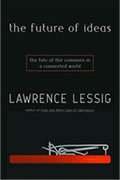 In 2001, Stanford law professor Lawrence Lessig published The Future of Ideas: The Fate of the Commons in a Connected World. Here, Lessig launched a campaign against American copyright law, arguing that it has become so restrictive that it stifles cultural innovation and social progress .… which undermines the original point of copyright law. Back in 1787, the founding fathers included the “copyright clause” in the American constitution, looking to give authors a short-term incentive to innovate and ultimately contribute to the public good. (Article I, Section 8 empowers Congress “To promote the Progress of Science and useful Arts, by securing for limited Times to Authors and Inventors the exclusive Right to their respective Writings and Discoveries.”). At the outset, copyright law protected forms of expression — and let authors profit from them — for a minimum of 14 years and a maximum of 28. Then, the material went into the public domain. But over time, the protections placed on cultural expression have been extended, and now works are protected so long as an author is alive, and then another 70 years. That’s potentially up to 140 years or more. All of this has happened because Congress has been successfully lobbied by large media corporations (e.g. Disney), wanting to monetize their media assets (think, Mickey Mouse) indefinitely.
In 2001, Stanford law professor Lawrence Lessig published The Future of Ideas: The Fate of the Commons in a Connected World. Here, Lessig launched a campaign against American copyright law, arguing that it has become so restrictive that it stifles cultural innovation and social progress .… which undermines the original point of copyright law. Back in 1787, the founding fathers included the “copyright clause” in the American constitution, looking to give authors a short-term incentive to innovate and ultimately contribute to the public good. (Article I, Section 8 empowers Congress “To promote the Progress of Science and useful Arts, by securing for limited Times to Authors and Inventors the exclusive Right to their respective Writings and Discoveries.”). At the outset, copyright law protected forms of expression — and let authors profit from them — for a minimum of 14 years and a maximum of 28. Then, the material went into the public domain. But over time, the protections placed on cultural expression have been extended, and now works are protected so long as an author is alive, and then another 70 years. That’s potentially up to 140 years or more. All of this has happened because Congress has been successfully lobbied by large media corporations (e.g. Disney), wanting to monetize their media assets (think, Mickey Mouse) indefinitely.
Anyway, this is a long way of telling you that you can now download The Future of Ideas for free. Lessig persuaded Random House to release the book under a “Creative Commons” license, using the argument that free e‑books will actually stimulate sales of paper copies. (Do you really want to read 350 pages on your computer screen?)
This is not the first time that Lessig has worked with this model. One of his previous books, Free Culture: How Big Media Uses Technology and the Law to Lock Down Culture and Control Creativity, was also made freely available in digital format. (You can download a free audiobook version or buy the paper version here.)
As a final note, I should mention that Lessig will be leaving behind his focus on these copyright issues, and turning his sights to corruption in Washington. Below you can watch him outline the problem that he’s looking to tackle.


YES! Free Books are awesome.
Thanks, I’ll read it. I want to learn more about copyright. Has it changed much since 2001 though?
Also, I find it amusing (or maybe it’s prophetic?) that this post was published in the same day the RIAA website got wiped… http://torrentfreak.com/riaa-website-hacked-080120/
are there still valid links available?
greetings,
jaithn
[…] * One of my blog posts won a contest at CES. No, it wasn’t the previous post about CES. It wasn’t anything from this blog. This was a contest run by the non-profit Internet Innovation Alliance, and those folks judged my post there to be better than anything else written at their booth. Woo hoo! (If you want to read Lawrence Lessig’s The Future of Ideas, you can learn how to download a free copy.) […]
[…] * One of my blog posts won a contest at CES. No, it wasn’t the previous post about CES. It wasn’t anything from this blog. This was a contest run by the non-profit Internet Innovation Alliance, and those folks judged my post there to be better than anything else written at their booth. Woo hoo! (If you want to read Lawrence Lessig’s The Future of Ideas, you can learn how to download a free copy.) […]